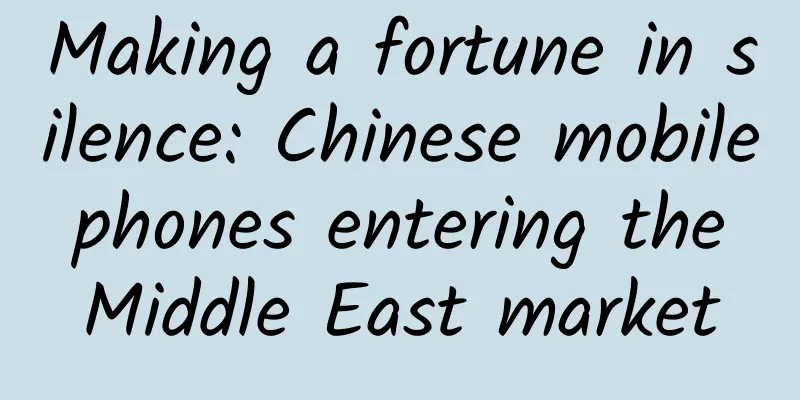Making a fortune in silence: Chinese mobile phones entering the Middle East market

|
Cross-cultural communication has always faced many challenges. Smartphones and mobile Internet from the Western world have made the Islamic Middle Eastern countries very wary. However, it was the Chinese businessmen who overcame various obstacles and successfully sold "halal phones" to the Islamic market. Long before iOS and Android became as popular as they are now, China's low-priced mobile phones had already made a name for themselves in the Middle East. A news article in April 2009 stated that most of the Chinese mobile phone brands that have grown in the Middle East come from the Pearl River Delta, including Shenzhen, Dongguan and other places. Chinese brand mobile phones represented by KDI, KINGBOND, ANYCOOL, etc., have successfully built their own brands after two years of development (in other words, since 2007), and have become well-known brands in Egypt, Turkey and other regions, and are deeply favored by local consumers. Compared with international brands at the time such as Nokia, Motorola, Sony Ericsson, LG, etc., these mobile phones pay more attention to the cost-effectiveness of the products and have a fashionable appearance. In addition to dual-SIM dual-standby, they have also developed innovative and practical functions such as TV reception for the local market. In the recent years when smartphones have been on the rise, some Chinese brands with relatively large shipments have dominated the Islamic market. For example, Huawei Mate 9 has been sold in Malaysia (also a major Islamic country) and Kuwait. There is also an interesting story about Huawei. Siraaj Abrahams, a 41-year-old businessman from Cape Town, South Africa, encountered two robbers. The Huawei P8 Lite on his chest blocked the bullets for him. This businessman is also a Muslim. Shenzhen's small copycat factories have not sunk, and an OEM manufacturer of mobile phones and tablets has launched related products in the UAE. The price of smart phones ranges from 449 to 999 dirhams, which is about 850 to 1,890 yuan in RMB. The Ministry of Commerce website said that IDC Middle East and Africa predicted in early 2015 that the market share of Chinese brand smart phones in the Middle East and Africa would double that of 2014. In fact, it is very easy to develop something related to religious beliefs. Everyone can think of doing some optimization for Buddhism. We have all seen the "consecrated" mobile phones in TV shopping, with golden Buddha images on the mobile phone wallpapers that you can worship and burn incense in front of. WeChat has even just announced a ban on non-religious groups from developing H5 Buddha worship applications for profit. Then isn't it natural for Muslims to develop? For example, a dedicated application for the Quran, a compass for the direction of Mecca, etc., these things are effortless to make, and are also very convenient for local people. At present, the first mobile live broadcast platform in the Arabic world is made by Chinese people, called 7 Nujoom. It is hard to imagine that the online live broadcast model that is in full swing in China can also prevail in the Middle East, an Islamic land. It is even harder to imagine that the platform is operated by Chinese people. According to the White Whale Community, which focuses on the overseas expansion of mobile Internet, the main issues that need to be paid attention to in operation include: a large amount of cost needs to be invested in cultivating users, and all content that does not conform to the doctrine is expressly prohibited. Due to the time difference and cultural differences among countries in the Middle East, it will also cost more in operation. You can even find some domestic export companies on Alibaba that specifically target the Muslim market, and they are also involved in the field of smart hardware. For example, the business scope of this Shenzhen company is: "Specialized development of Quran reading pens, Quran mp3/mp4/mp5, Quran speakers, pilgrimage watches and other Islamic electronic products. The factory undertakes OEM, SMT patch processing, product assembly and processing, one-stop service." Their flagship products also include "Quran reading pens". Well, you guessed it right, it is indeed "what you don't understand, you can read it". As long as they can go to other places in the world, Chinese people will do their business there, and the Middle East is no exception. In particular, the Middle East is also an important area of the "Silk Road Economic Belt" route in the "Belt and Road" initiative, which is of great significance to China's development. In these countries that are affected by Islamic law to varying degrees, Chinese businessmen can always get along well with local managers, and their pragmatic and hardworking qualities make them popular. A story written by He Wei of The New Yorker is much more shocking than the story about halal phones: Chinese businessmen walked into religiously conservative Egypt with sexy lingerie. In an interview, He Wei quoted a diplomat's evaluation of Chinese businessmen: "As long as people like something, the Chinese will sell it. They don't ask too much, no matter what you buy it for. Whether Egypt is holding elections, suppressing the people, or jailing journalists. They don't care. ... Americans think if everyone becomes like me, no one will attack me. China is different. It doesn't want to convey its values to the world. China's strategy is to establish economic cooperation, so that if any country decides to cut off economic ties, both sides will suffer." I think that these Chinese people who have penetrated deeply into Islamic countries and have unconsciously acted as cultural ambassadors in cross-border trade at least understand one simple truth: it is best to make a fortune in silence. As a winner of Toutiao's Qingyun Plan and Baijiahao's Bai+ Plan, the 2019 Baidu Digital Author of the Year, the Baijiahao's Most Popular Author in the Technology Field, the 2019 Sogou Technology and Culture Author, and the 2021 Baijiahao Quarterly Influential Creator, he has won many awards, including the 2013 Sohu Best Industry Media Person, the 2015 China New Media Entrepreneurship Competition Beijing Third Place, the 2015 Guangmang Experience Award, the 2015 China New Media Entrepreneurship Competition Finals Third Place, and the 2018 Baidu Dynamic Annual Powerful Celebrity. |
<<: Infiniti partially recalls more than 200 QX60 hybrid vehicles
>>: Ford F-150 hybrid version does not provide EV mode, endurance becomes a bottleneck
Recommend
What is Baidu Wancibaping? How to do it?
What is Baidu Domination? Let me teach you how to...
How to plan a large-scale promotional event?
What are the big promotions? It generally refers ...
Share this! What to do when encountering freezing rain? Here are 5 tips for a safe trip!
In addition to the sudden drop in temperature, th...
Analysis of Toutiao's competitive products
With the rapid development of the Internet, peopl...
The animal world's "Train to Busan", are you scared?
Produced by: Science Popularization China Author:...
Why can’t a girl unscrew the cap of a bottle but can unscrew the top of her boyfriend’s head?
【appendix】 1. When a factory produces bottled bev...
Internet TV sales have dropped by nearly 70%. Who will be the next winner after Xiaomi and Sharp?
2017 was a year of reorganization for China's...
US mobile game market survey: middle-aged men are most willing to spend money
On October 17, Everyplay, a mobile game company u...
How to create an app with tens of millions of users?
In the era of "users are king", owning a...
Let’s talk about the exchange of volume in App promotion
Generally speaking, resources for exchanging traf...
Why is the butterfly the most perverted and cruel creature in the world? Learn about its metamorphosis
When it comes to the most perverted and cruel cre...
The bank’s facial recognition system was hacked. Where might the vulnerability lie?
Previously, the news that "bank facial recog...
21-day writing boot camp: let you make money by writing, you can start writing even if you have no basic knowledge, and have an additional side job to earn money while lying down at home!
21-day writing boot camp: let you make money by w...
OPPO App Store CPD Account Recharge Guide
1. Account Recharge Path: Finance – Account Recha...
What is legitimate defense? How can we act bravely?
Mixed Knowledge Specially designed to cure confus...









